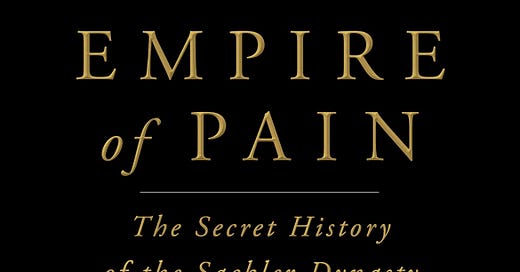Book Review. Empire of Pain: The Secret History of the Sackler Dynasty, by Patick Radden Keefe
Perhaps the greatest nonfiction book of all time (next to McCullough's John Adams).
There likely is not a place in the country that hasn’t been touched by the opioid epidemic. This is largely because, unlike cocaine, or crack, or meth, opioids are legal and were pushed, via sales marketing and crooked doctors, by American pharmaceutical companies, Purdue Pharma being the most prominent. This is a point that should be kept in mind when listening to Vice Presidential candidate J.D. Vance talk about his mother’s addiction and recovery. This is because Vance tries to make the claim that his mother became addicted as a result of illegal drugs coming over the southern border.1 This is only partly true. In fact, Vance’s mother was a nurse who one day purloined from the medicine cabinet a Vicodin to treat a headache. The sensation led to her steal stronger drugs from the doctor’s cabinet such as Percocet. (Percocet is acetaminophen and oxycodone—oxycodone is a faster releasing form of OxyContin, the drug that got Purdue Pharma into trouble. She became addicted to percocet and eventually lost her job and her nurses license.) It was only after losing her job, and her access to prescription medication, that she started snorting the illegal stuff, heroine.2 But the gateway drug was made in and distributed worldwide from the USofA.
Empire of Pain traces the origins of the opioid crises by telling the history of the Sackler empire and showing how the fruits of that empire got out of control. The book covers three generations of Sacklers. The first part of the book tells the story of the brothers Arthur, Mortimer and Raymond as they started their businesses. And how the Sacklers essentially pioneered the pharmaceutical sales profession as we know it today, from selling to doctors to lobbying Congress to publishing their own slanted studies. Arthur Sackler, in particular, was an endlessly creative and energetic man who operated in a closed universe with absolutely no transparency. His company made the drugs, and surreptitiously published the journals that ran the studies and the advertising approving of these drugs. He also ran conferences and paraded out experts planted by the company to promote these drugs—all done under a veneer of objectivity and professional ethics, but with fake claims, fake doctors, fake statistics, and fake patient testimonials.
The original Sacklers were all about money and prestige (all those museums!). The later generations, the Oxy-Sacklers, were really only about money. And they were about making money at all costs. This meant turning a blind eye to the epidemic they were creating, and doing everything they could to keep the business booming, no matter who got hurt.
This is also a story about drug patents and how companies get around patents by making minor modifications to drug recipes and delivery systems, and by buying out politicians and researchers and people at the Food and Drug Administration (FDA) so that they don’t lose business to the generic market.
Empire of Pain is also a legal drama. It discloses how the Sacklers were able to take advantage of the legal system to protect themselves. How they were able to conceal evidence as part of plea deals. How they were able to protect their money from bankruptcy court.3 How the political system and the justice system cohabitate and prevent powerful people from paying for their misdeeds. This was true throughout the history of the Sackler empire, but it was the Trump administration that ultimately let them off.4
I finished the book in the morning before going to work (I am a deputy attorney general). After work, I found myself filled with rage as I got in my car. Work was good, but the book had been quietly percolating in me all day. I had to do breathing exercises before driving home.
Side note: If you ever pick up a nonfiction book and see that the writer was published in the New Yorker, 9 times out of 10 it’s a winner.
Linskey, A. (2024, October 2). Vance invokes his mother’s struggles with drug addiction. WSJ. https://www.wsj.com/livecoverage/vance-walz-vice-presidential-debate-election-2024/card/vance-invokes-his-mother-s-struggles-with-drug-addiction-TbDMmhbw61wSWLpFatyG
McCreesh, S. (2024, October 2). Vance’s mother deals with her past and his future. The New York Times. https://www.nytimes.com/2024/09/26/us/elections/jd-vance-mother-beverly-aikins-relationship.html.
See also, Rissman, K. (2024, November 1). Who is JD Vance’s mom? Nurse Beverly Aikins’ journey of addiction and redemption. Yahoo Life. https://www.yahoo.com/lifestyle/jd-vance-mom-nurse-beverley-163917331.html.
For the latest on the Sackler bankruptcy, see, among others, Howe, A., & Amy-Howe. (2024, June 28). Supreme Court blocks OxyContin bankruptcy plan. SCOTUSblog. https://www.scotusblog.com/2024/06/supreme-court-blocks-oxycontin-bankruptcy-plan/.
Excerpted from the book:
…As it turned out, Mary Jo White and other attorneys for the Sacklers and Purdue had been quietly negotiating with the Trump administration for months. Inside the DOJ, the line prosecutors who has assembled both the civil and the criminal cases started to experience tremendous pressure from the political leadership to wrap up their investigations of Purdue and the Sacklers prior to the 2020 presidential election in November. A decision had been made at high levels of the Trump administration that this matter would be resolved quickly and with a soft touch. Some of the career attorneys at Justice were deeply unhappy with this move, so much so that they wrote confidential memo registering their objections, to pressure a record of what they believed to be a miscarriage of justice.
The Trump administration declined to pursue criminal charges against the Sacklers.



